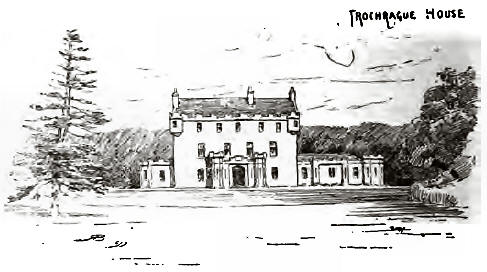|

TROCHRAGUE stands about two miles from Girvan, and is one of the old
houses of the gentry mentioned by Abercrombie in his account of Carrick
(1686). It then belonged to a branch of the Boyds, who produced two men
noted in the Church history of their day. The first was James Boyd, second
son of Adam Boyd of Penkill. He was born at Trochrague, and, when a young
man, was present with his chief at Langside battle (1568), on the side of
Queen Mary. After passing through a course of philosophy he went to France,
where he studied law, and on coming home, espoused the cause of the
Reformation. But although a Protestant, he was but a lukewarm Presbyterian,
and consented to be appointed Tulchan Archbishop of Glasgow in 1573.
He died in 1581, and was buried in the crypts of the Cathedral. It is
recorded of him in Scott's Fasti that he was the first Protestant
minister of Kirkoswald, and used regularly to officiate there while staying
at Trochrague.
His son Robert was one of the most learned
men of his time, and wrote an elaborate commentary on the Ephesians, of
which Dr James Walker says:—"It is a work of stupendous size and stupendous
learning. The Greek and Latin fathers, the writers of the dark ages, the
Protestant and Romish theologians of his own time, are all at hand to render
aid or to receive replies." He was born in Glasgow, brought up at Trochrague,
educated at Ayr, and took his degree in Edinburgh. He then went to France,
where he was appointed Professor of Divinity at Saumur. King James I.
having, in 1615, heard of his fame, appointed him Principal of Glasgow
University, and afterwards of Edinburgh University. Finding him, however,
more staunchly Presbyterian than his father, the king caused him to be
deprived of his office. He next became minister of Paisley, but a riot
having been instigated against him, he demitted his charge, and retired to
Trochrague. In declining health he went to Edinburgh in search of medical
advice, where he died in 1627. In his will, he left twenty pounds "to help
to buy ane bell to the kirk of Daylie, and twenty merks, including thairin
the ten merks alreaddy promeist, to the bigging of the brig of Gimme." His
grandson, also called Robert, was a staunch Covenanter, like most of the
Carrick lairds, and was thrown into prison for refusing the Test oath, only
obtaining his liberty on payment of a fine of a thousand merks for church
irregularities, and giving a bond and caution for ^2000 sterling, to live
regularly and orderly in future.
|

